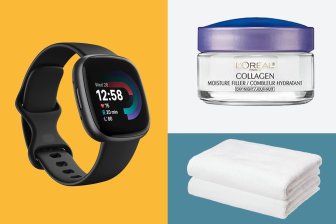We look forward to the holidays for a variety of reasons — family togetherness and communal celebrating among them. But it’s perhaps the seemingly endless Bacchanalian spread of decadent food and drink that tops the list of holiday benefits.

Come early January, however, you can be left feeling like you have a celebration hangover, the symptoms of which include feeling bloated, sluggish and a little heavier than usual. Combine that with the number one New Year’s resolution — to lose weight — and it’s easy want to rush to find a quick solution.
In recent years, detoxes have become the go-to answer for people who want to cleanse their systems of toxins and, ultimately, excess weight. But doctors and nutrition experts are quick to caution that “detox” is something of a misnomer.
“The problem with the term ‘detox’ is that it is very vague,” says Dr. Avantika Marwaha, a gastroenterologist at the GI Health Centre in Burlington, ON. “It is being used as a marketing tool to imply that one needs to ‘detoxify’ and remove ‘toxins’ from a healthy body. There is no such reality.”
In fact, the word “detox” has been co-opted by the natural health community from medicine, where its true meaning relates to the “process of withdrawl from alcohol or drugs by the people addicted to those substances,” according to Berkeley Wellness, the online resource for the School of Public Health at the University of California, Berkeley. “There’s no evidence that a special detox diet or fast can take the place of or supplement what your own body is naturally programmed to do.”
READ MORE: 8 so-called ‘healthy’ foods registered dietitians wouldn’t (or rarely) eat
That’s not to say, however, that following a conscientious diet post-holiday debauchery won’t help to get you back on track.
“I do not promote detoxing,” says Kyle Byron, a Toronto-based nutritionist. “You can’t increase the speed in which your body purges toxins, because that’s the job of your liver, and it’s purging toxins 24 hours a day.”
He advises clients to adopt a clean eating plan or a Paleo diet for a few days.
“Eliminate all alcohol, caffeine, nicotine and processed food, and you’ll already be eating and living healthier than 99.9 per cent of North Americans,” Byron says.
Add to that two to three litres of water a day, 10,000 to 20,000 steps, a daily intense workout of at least 30 minutes and a 10 p.m. bedtime, and you’ll feel amazing, he says.
Byron recognizes that it’s a spartan way of life, however, which is why he doesn’t recommend it for more than three or four days.
“Most people can’t do it for more than that or they’ll crack,” he says. “But it’s just enough time to get back to feeling good. The reality is, people just want to straighten up and fly right after the holidays. This plan will help do that.”

WATCH ABOVE: How clean eating can help get you on a healthy track.
Holistic nutritionist Samantha Van De Wal will often keep clients on a similar diet for a little longer to help the routine stick.
“Through past experience, I’ve found 10 days to be the right fit,” she says. “It allows people to get into the habit of healthier eating and isn’t too overwhelming.” Although she also offers online support through Skype meetings to help clients stay on track.
Van De Wal advises incorporating detoxifying foods like dandelion greens (or tea), artichokes, asparagus, brussels sprouts, cabbage, and cauliflower, though she does sum it up by saying, “it’s really just clean eating.” And she never espouses focusing on any one organ at a time.
READ MORE: Reality check: the skinny on ‘skinny’ alcohol
“We have seven organs of elimination — liver, kidneys, bowels, skin, lymphatic system and lungs — and want to make sure they’re all functioning properly,” she says. “The reason I focus on all seven at once is because they all work simultaneously. If something is filtered through the liver and kidneys, it will then make its way to the bowels and if they don’t flush it out, it’ll eventually make it to the skin and cause reactions like acne.”
Perhaps the biggest takeaway in the “detox” demystification is that it should never involve eliminating food altogether.
“You don’t need to buy a case of juice and eliminate foods like protein — those are unhealthy decisions,” Byron says. “You can end up in the hospital.” He also points out that a juice or water cleanse can perpetuate eating disorders in anyone who’s prone to that way of thinking.
Eat healthily for a few days and get your body back to a balanced place, he says. “The following weekend, go out and have a pizza and a glass of wine. It’s not going to kill you. In fact, it’ll help you establish a good relationship with food and with your body, and it’ll help you stay healthy for the rest of your life.”







Comments